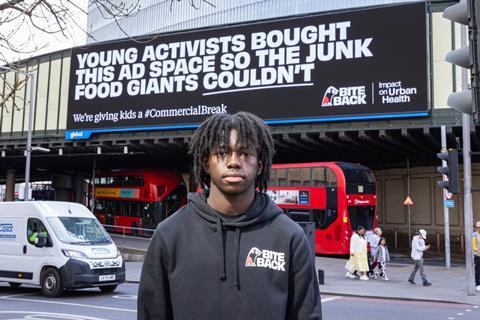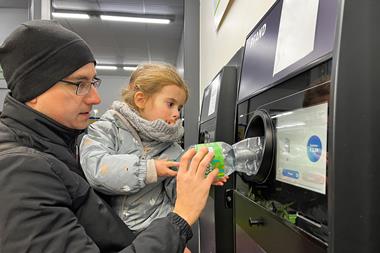
Youth activist group Bite Back claims to have been “silenced” after two of the UK’s leading outdoor advertising companies refused to display its anti-junk food billboards.
According to Bite Back, JCDecaux and Global both rejected its ‘#CommercialBreak’ campaign, which included billboards featuring the text: “Youth activists bought this ad space so the junk food giants couldn’t”.
The companies, which together control around 70% of the UK’s digital outdoor ad impressions, had initially approved the ads. However, both had reversed their initial decisions, with JCDecaux doing so just days before the ads were due to launch, according to Bite Back.
The rejections made it “near-impossible for Bite Back to access outdoor space – while brands like McDonald’s, Coca-Cola and Cadbury remain plastered across the country”, said the campaign group.
‘Political messaging’
When Bite Back launched the ‘#CommercialBreak’ campaign across south London in April, it passed all regulatory checks with the Committee of Advertising Practice (CAP).
However, media owners had since issued blanket refusals, claiming the ads contained ‘political messaging’ and preventing a nationwide rollout, said Bite Back.
It comes just one week after Bite Back scooped the Sheila McKechnie Award for Best Consumer Campaign for #CommercialBreak.
“I can’t believe we’ve just collected an award for our work – and already the industry is trying to silence us,” said 17-year-old Bite Back activist Farid.
“It’s frustrating but also revealing. We broke no rules or regulations. If they didn’t think our message mattered, they wouldn’t try so hard to keep it out of sight.
Bite Back interim CEO Nicki Whiteman said: “It is increasingly clear that there are industry actors who want to silence youth voices and censor kids from sharing their experiences of advertising bombardment.
“These refusals feel less like coincidence and more like an industry that wants to conceal the role it plays in harming children’s health.”
JCDecaux and Global declined to comment.



















No comments yet